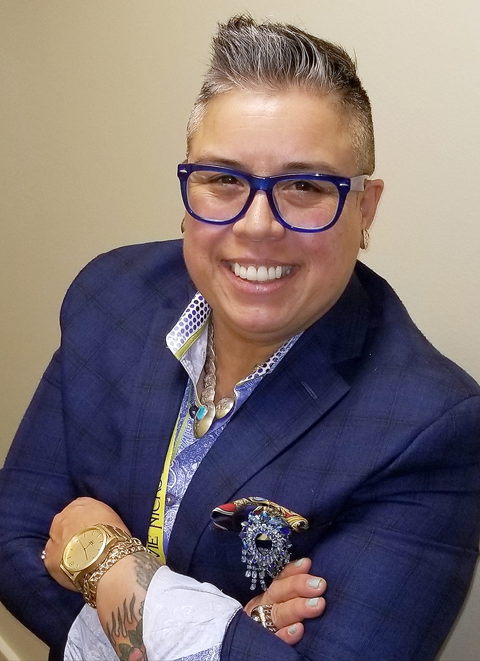Q&A with Judge Rosie Speedlin Gonzalez
Rosie Speedlin Gonzalez
Judge | Bexar County, TX
 Tell us about your background. What are the experiences, including education, that make up the person you currently are?
Tell us about your background. What are the experiences, including education, that make up the person you currently are?
I earned a Bachelor’s degree in political science and government from St. Marys University in 1987 and spent the next several years working as a probation officer. Then, in 2001, I completed a J.D. at St. Marys University School of Law. I was certified as a Child Welfare Specialist by the National Association of Counsel for Children. After graduating from law school, I entered into private practice, where I represented children in foster care or the Child Protective Services system.
I have served on the Bexar County Small, Minority, and Women Business Enterprise Advisory Committee. During my tenure there, I helped ensure that LGBT firms would be included in the county’s contracting policies and procedures.
What was your trigger moment and why this specific office?
Prior to attending law school, I had an 11-year career in the social services fields, working primarily with at-risk youth and disenfranchised communities. Upon becoming an attorney, I was drawn to practice fields that felt familiar like family law and child welfare law. I practiced for 17 years and did a great deal of pro bono work for family violence victims. Bexar County has record numbers of child abuse and domestic violence cases. It was the growing number of these cases that called me to want to run for this bench and start to work on solutions to the problem of intimate and family violence.
What made you feel qualified to run for office?
I met the legal requirements and brought with me a lifetime of experience as a problem solver. I also witnessed many miscarriages of justice by a judiciary that was not vested in the betterment of our community, so I decided I needed to run for the bench in order to affect change from that perspective and level as opposed to what I had been doing as a lawyer.
Do you work full-time or part-time?
Full-time.
Most people don’t know what their elected official does on a daily basis. What’s a typical day looking like for you?
9:00a arrive for morning docket (pleas, bond hearings, magistrations) all on Zoom
12:00p lunch (often a working lunch because I have meetings to attend)
1:30p afternoon docket (bond hearings, modification of bond conditions hearings) all on Zoom
5:00p End of day
In between all that, I sign judge’s warrants for DEF who are not complying with bond conditions, I sign warrant requests, I review statistical data for purposes of improving court performance, I give interviews to media outlets who are covering DV issues and stories . . . and every other week I preside over a specialty court: REFLEJO COURT, a court of 1st impression for 1st-time offenders of DV with a history of substance abuse. REFELJO COURT offers these defendants an opportunity to work the 9-12 month trauma-informed program and once they complete the program successfully, their case is dismissed and expunged, and the DEF is not labeled a violent offender for the rest of their lives.
Additionally, they might not know what their elected official is responsible for. What is your role in comparison to other elected offices on your level?
I preside in one of only 2 Bexar County Court at Law courts that hear and handle exclusively misdemeanor family violence cases. The range of punishment is up to 1 year of incarceration, plus up to a $4,000 fine, and their 2nd Amendment right to have guns can be taken from them for a lifetime.
What do you think people would be surprised to know someone in your position does?
The overwhelming amount of paperwork that goes with the administration of justice.
What are 3-5 skills needed to be successful in the elected office you served in/are currently serving in?
1. Listen; 2. Listen; 3. Listen
What’s the best part about serving in elected office?
Serving the people of Bexar County.
What has been the accomplishment you’re most proud of while in office?
Co-authoring HB 3529 which led to it being signed in law by Gov. Abbott and creating REFLEJO COURT.
In terms of finances, how much money did you have to raise for your campaign?
I did not and do not accept any contributions from anyone. I spent $7,000 approximately in 2018 when I was elected/elevated to the bench by beating my incumbent opponent by over 75,000 votes.
What’s one piece of advice you would give to someone who’s thinking about running for the position you serve/have served in their community?
Go and get training on how to run: The Campaign School at Yale, The Victory Institute Campaign School for LGBTQ+ candidates.
